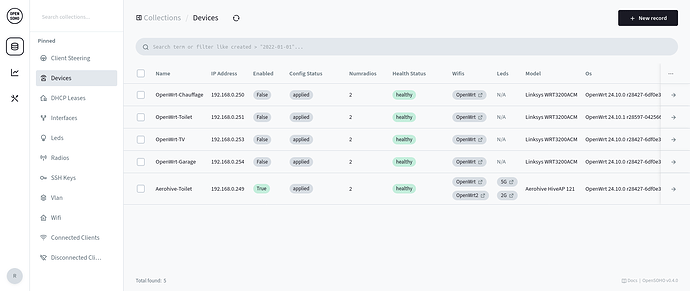Got a POST:
19:53:31.643448 IP (tos 0x0, ttl 64, id 39155, offset 0, flags [DF], proto TCP (6), length 52)
192.168.1.250.40878 > 192.168.1.254.8090: Flags [.], cksum 0x856f (incorrect -> 0x31ba), seq 8996, ack 235, win 63, options [nop,nop,TS val 48558841 ecr 2989676993], length 0
E..4..@.@....................J$b...?.o.....
.....2..
19:53:31.644002 IP (tos 0x0, ttl 64, id 39156, offset 0, flags [DF], proto TCP (6), length 52)
192.168.1.250.40878 > 192.168.1.254.8090: Flags [F.], cksum 0x856f (incorrect -> 0x31b8), seq 8996, ack 235, win 63, options [nop,nop,TS val 48558842 ecr 2989676993], length 0
E..4..@.@....................J$b...?.o.....
.....2..
19:53:31.645741 IP (tos 0x0, ttl 64, id 46660, offset 0, flags [DF], proto TCP (6), length 52)
192.168.1.254.8090 > 192.168.1.250.40878: Flags [F.], cksum 0x2fff (correct), seq 235, ack 8997, win 501, options [nop,nop,TS val 2989676995 ecr 48558842], length 0
E..4.D@.@..6.............J$b......../......
.2......
19:53:31.645799 IP (tos 0x0, ttl 64, id 39157, offset 0, flags [DF], proto TCP (6), length 52)
192.168.1.250.40878 > 192.168.1.254.8090: Flags [.], cksum 0x856f (incorrect -> 0x31b4), seq 8997, ack 236, win 63, options [nop,nop,TS val 48558843 ecr 2989676995], length 0
E..4..@.@....................J$c...?.o.....
.....2..
19:53:34.668056 IP (tos 0x0, ttl 64, id 773, offset 0, flags [DF], proto TCP (6), length 60)
192.168.1.250.53180 > 192.168.1.254.8090: Flags [SEW], cksum 0x8577 (incorrect -> 0xb692), seq 636450549, win 32120, options [mss 1460,sackOK,TS val 48561866 ecr 0,nop,wscale 9], length 0
E..<..@.@..n............%.v.......}x.w.........
...........
19:53:34.669877 IP (tos 0x0, ttl 64, id 0, offset 0, flags [DF], proto TCP (6), length 60)
192.168.1.254.8090 > 192.168.1.250.53180: Flags [S.E], cksum 0x0719 (correct), seq 1554922085, ack 636450550, win 65160, options [mss 1460,sackOK,TS val 2989680019 ecr 48561866,nop,wscale 7], length 0
E..<..@.@..s............\.:e%.v..R.............
.2..........
19:53:34.669945 IP (tos 0x0, ttl 64, id 774, offset 0, flags [DF], proto TCP (6), length 52)
192.168.1.250.53180 > 192.168.1.254.8090: Flags [.], cksum 0x856f (incorrect -> 0x346d), seq 1, ack 1, win 63, options [nop,nop,TS val 48561868 ecr 2989680019], length 0
E..4..@.@..u............%.v.\.:f...?.o.....
.....2..
19:53:34.670162 IP (tos 0x2,ECT(0), ttl 64, id 775, offset 0, flags [DF], proto TCP (6), length 7292)
192.168.1.250.53180 > 192.168.1.254.8090: Flags [P.], cksum 0xa1b7 (incorrect -> 0x734e), seq 1:7241, ack 1, win 63, options [nop,nop,TS val 48561868 ecr 2989680019], length 7240
E..|..@.@..*............%.v.\.:f...?.......
.....2..POST //api/v1/monitoring/device/6264fcd4-9f48-4acb-9df1-280e053a7e2d/?key=f1f1e739d44137017da1b9a3e38cfd7d&time=24-08-2025_14:59:40.000000 HTTP/1.1
Host: 192.168.1.254:8090
User-Agent: curl/8.12.1
Accept: */*
Content-Type: application/json
Content-Length: 8726
{"type":"DeviceMonitoring","general":{"local_time":1756054779,"uptime":92929,"hostname":"ap-attic"},"interfaces":[{"mac":
<snip lots of JSON>
":0,"tx_window_errors":0,"tx_bytes":1885753091,"collisions":0,"rx_bytes":1303184020,"rx_fifo_errors":0,"rx_dropped":1,"tx_fifo_errors":0,"rx_compressed":0,"multicast":0,"tx_compressed":0,"rx_missed_errors":0,"tx_dropped":0},"up":true,"s
peed":"1000F"}],"resources":{"memory":{"total":486522880,"shared":2859008,"free":302714880,"cached":63057920,"available":320610304,"buffered":53248},"cpus":2,"disk":[{"filesystem":"\/dev\/root","available_bytes":0,"mount_point":"\/rom",
"used_percent":100,"size_bytes":13631488,"used_bytes":13631488},{"filesystem":"\/dev\/mtdblock13","available_bytes":10289152,"m
19:53:34.670200 IP (tos 0x2,ECT(0), ttl 64, id 780, offset 0, flags [DF], proto TCP (6), length 1807)
192.168.1.250.53180 > 192.168.1.254.8090: Flags [P.], cksum 0x8c4a (incorrect -> 0x5741), seq 7241:8996, ack 1, win 63, options [nop,nop,TS val 48561868 ecr 2989680019], length 1755
E.....@.@...............%..>\.:f...?.J.....
.....2..ount_point":"\/overlay","used_percent":19,"size_bytes":12713984,"used_bytes":2424832}],"load":[0.28,0.09,0.06],"swap":{"free":0,"total":0}},"dns_servers":["192.168.1.254"],"neighbors":[{"mac":"00:e2:69:59:1f:93","state":"REACHAB
LE","interface":"br-lan","ip":"192.168.1.254"},{"mac":"8c:3b:ad:2d:25:24","state":"REACHABLE","interface":"br-lan","ip":"192.168.1.252"},{"mac":"82:f6:6e:b4:0f:82","state":"STALE","interface":"br-lan","ip":"192.168.1.133"},{"mac":"b4:e6
:2d:79:d7:e8","state":"STALE","interface":"br-lan","ip":"192.168.1.53"},{"mac":"54:60:09:0b:ab:fe","state":"STALE","interface":"br-lan","ip":"192.168.1.33"},{"mac":"38:22:e2:2c:2b:d6","state":"REACHABLE","interface":"br-lan","ip":"192.1
68.1.2"},{"mac":"ec:b5:fa:08:51:88","state":"STALE","interface":"br-lan","ip":"192.168.1.40"},{"mac":"b4:e6:2d:7a:e6:df","state":"STALE","interface":"br-lan","ip":"192.168.1.51"},{"mac":"94:e3:6d:98:0d:8a","state":"STALE","interface":"b
r-lan","ip":"192.168.1.31"},{"mac":"02:42:c0:a8:01:d9","state":"STALE","interface":"br-lan","ip":"192.168.1.217"},{"mac":"84:f3:eb:e6:7b:86","state":"STALE","interface":"br-lan","ip":"192.168.1.54"},{"mac":"dc:ef:09:f2:76:00","state":"R
EACHABLE","interface":"br-lan","ip":"192.168.1.253"},{"mac":"4c:11:ae:04:17:ec","state":"STALE","interface":"br-lan","ip":"192.168.1.52"},{"mac":"b0:7f:b9:f8:23:ae","state":"REACHABLE","interface":"br-lan","ip":"192.168.1.251"},{"mac":"
18:65:71:e5:fb:15","state":"STALE","interface":"br-lan","ip":"192.168.1.12"},{"mac":"00:a0:de:d4:c8:89","state":"STALE","interface":"br-lan","ip":"192.168.1.30"},{"mac":"02:42:c0:a8:01:d1","state":"STALE","interface":"br-lan","ip":"192.
168.1.209"},{"mac":"b8:4d:43:c2:23:7c","state":"STALE","interface":"br-iot","ip":"fe80::ba4d:43ff:fec2:237c"}]}
19:53:34.671054 IP (tos 0x0, ttl 64, id 29821, offset 0, flags [DF], proto TCP (6), length 52)
192.168.1.254.8090 > 192.168.1.250.53180: Flags [.], cksum 0x1c2f (correct), seq 1, ack 5793, win 475, options [nop,nop,TS val 2989680021 ecr 48561868], length 0
E..4t}@.@.@.............\.:f%......../.....
.2......
19:53:34.672239 IP (tos 0x0, ttl 64, id 29822, offset 0, flags [DF], proto TCP (6), length 52)
192.168.1.254.8090 > 192.168.1.250.53180: Flags [.], cksum 0x168f (correct), seq 1, ack 7241, win 467, options [nop,nop,TS val 2989680021 ecr 48561868], length 0
E..4t~@.@.@.............\.:f%..>...........
.2......
19:53:34.672269 IP (tos 0x0, ttl 64, id 29823, offset 0, flags [DF], proto TCP (6), length 52)
192.168.1.254.8090 > 192.168.1.250.53180: Flags [.], cksum 0x0fc1 (correct), seq 1, ack 8996, win 454, options [nop,nop,TS val 2989680021 ecr 48561868], length 0
E..4t.@.@.@.............\.:f%..............
.2......
19:53:34.672298 IP (tos 0x2,ECT(0), ttl 64, id 29824, offset 0, flags [DF], proto TCP (6), length 286)
192.168.1.254.8090 > 192.168.1.250.53180: Flags [P.], cksum 0x22ac (correct), seq 1:235, ack 8996, win 501, options [nop,nop,TS val 2989680022 ecr 48561868], length 234
E...t.@.@.@.............\.:f%......."......
.2......HTTP/1.1 301 Moved Permanently
Location: /api/v1/monitoring/device/6264fcd4-9f48-4acb-9df1-280e053a7e2d/?key=f1f1e739d44137017da1b9a3e38cfd7d&time=24-08-2025_14:59:40.000000
Date: Sun, 24 Aug 2025 17:53:34 GMT
Content-Length: 0
I’m taking a guess here, but could the http/301 be caused by the length of the packet?
– EDIT –
It took me a bit of tinkering in OpenSOHO, but I managed to:
- Create a Wifi network
- Did not connect this Wifi network to a vlan, although one exists in OpenSOHO config.
- Did not create a Radio interface
- Did not create a Network interface
- Only select the Wifi network (picker) in Devices for the guinea pig OpenWRT device (after setting the
#numradios
And I’ve got an additional SSID, created and managed by OpenSOHO on both 2.4GHz and 5GHz radio’s with an identical setup! So in fact less to configure in OpenSOHO than I initially assumed.
What was unclear to me, is that OpenSOHO only touches Wifi, vlan, radio and interfaces that it creates. It doesn’t touch any other configuration that is already present on the OpenWRT device, which is good in my perspective, so I can’t soft brick myself out of the OpenWRT device (at least not via OpenSOHO).
 )
)